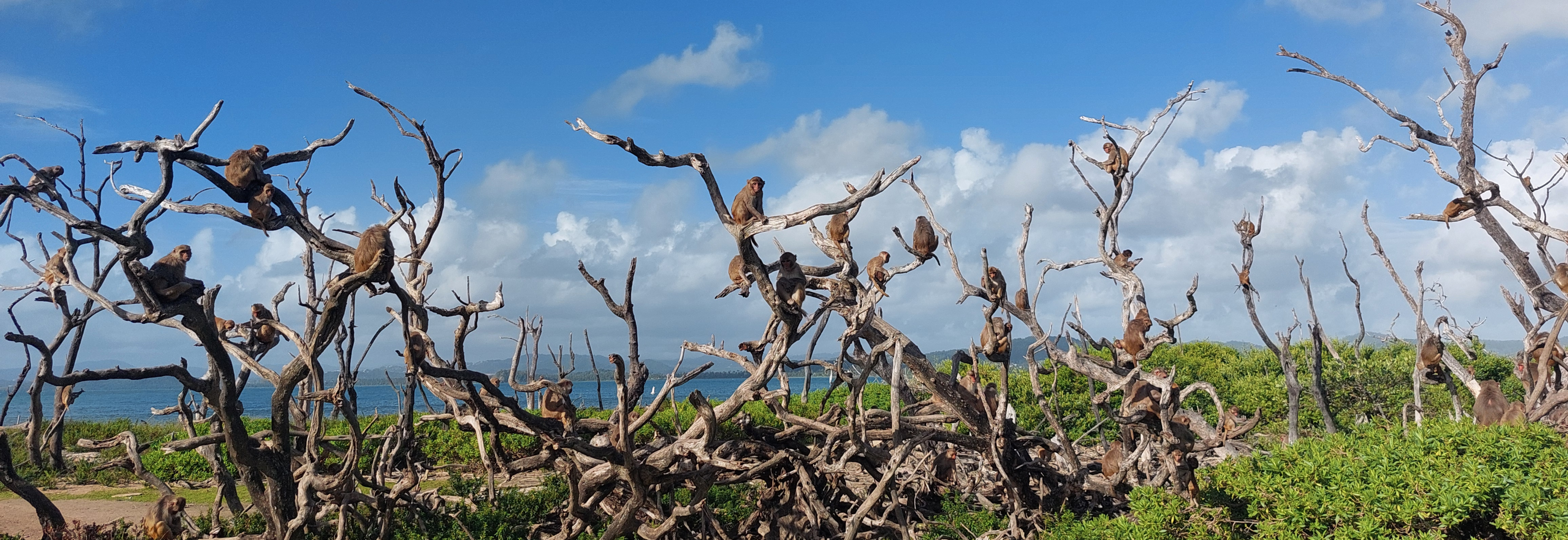The monkeys of Cayo Santiago were known for their aggression – until Hurricane Maria struck in 2017. Although the humans of nearby Puerto Rico were harder hit, with 3,000 deaths, the resource depletion the monkeys suffered changed them in ways that have continued to this day.
Cayo Santiago is a unique site, greatly valued by scientists. It is known as “Monkey Island” because in 1938, hundreds of rhesus macaques (Macaca mulatta) were imported and without predators, they have been thriving ever since. The opportunity to study large populations of our fellow primates in a semi-wild setting with relative ease exists nowhere else on Earth.
When war or natural disaster makes resources more scarce, humans often become more violent and aggressive, holding on more tightly to the little we have. We might think it was the same for macaques, but the lessons of Hurricane Maria show that’s not always the case.
The hurricane destroyed 63 percent of the island’s vegetation, but most macaques survived. On an island where their population density is similar to humans in New York City, that created a resource problem.
In the tropical heat, macaques need shade to survive, and now there was a great deal less of it. Instead of initiating monkey wars over the little shade that was left, as primatologists expected, the inhabitants learned to live and let live.
“In response to the drastic changes caused by the hurricane, macaques persistently increased tolerance and decreased aggression towards each other,” said Dr Camille Testard, of the University of Pennsylvania in a statement. “This enabled more macaques to access scarce shade.”
The island is crowded for the monkeys, and when the trees are killed, things get worse.
Image credit: Lauren Brent
When Testard and colleagues studied ten years of observations from before and after the hurricane, they found being good at sharing was now a major survival enhancer.
“Before the hurricane, tolerating others had no impact on risk of death,” Testard said. “Afterwards, macaques that displayed more than average social tolerance – and were therefore better able to share shade – were 42% less likely to die than those that were less tolerant.”
Once you’ve shared a patch of shade with someone, it forms a bond, or so it seems. “We found that this tolerance spills over into other daily interactions,” Testard noted. “Macaques that began sharing shade also spend time together in the mornings, before the day’s heat forces them to seek shade.” That’s not something that always comes easily to the macaques, as Testard depicts in part of an extended cartoon on the topic.
A chart of four primate species on a normal tolerance-aggression scale. Rhesus macaques normally don’t like to share.
Image credit: Caroline Hu. In collaboration with Camille Testard for scripting.
This may indicate that, at least in some ways, macaques and humans are not so different. Social proximity has been proposed to overcome hostile attitudes such as bigotry, although unfortunately, it’s not failsafe. Moreover, researchers provide the macaques with plenty of food, which they managed to largely maintain after the hurricane, Perhaps if this was in short supply, instead of shade, the effect would have been different.
Suddenly, on Cayo Santiago, it’s survival of the nicest, or at least the most tolerant. “For group-living animals, social relationships may allow them to cope with disturbances in the environment, including human-induced climate change,” said co-author Professor Lauren Brent of the University of Exeter. “We were surprised the macaques’ social behaviour was so flexible, making them resilient to this environmental change, but some species may not display this same flexibility.”
Put it another way, “Monkeys together strong.”
Sometimes a crisis brings us together.
Image credit: Caroline Hu. In collaboration with Camille Testard for scripting.
There probably isn’t a gene for shade-sharing, but it is likely to be a partially heritable trait. If so, the future of Cayo Santiago may be a kinder and more peaceful one.
Who votes for luring a bunch of billionaires and heads of government to a tropical island just before a hurricane goes through? Even if it doesn’t work, it would make great reality TV.
The study is published in Science.
Source Link: These Monkeys Had A Stable Society – Until A Hurricane Forced Social Change
